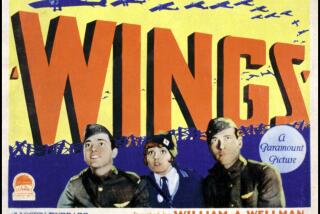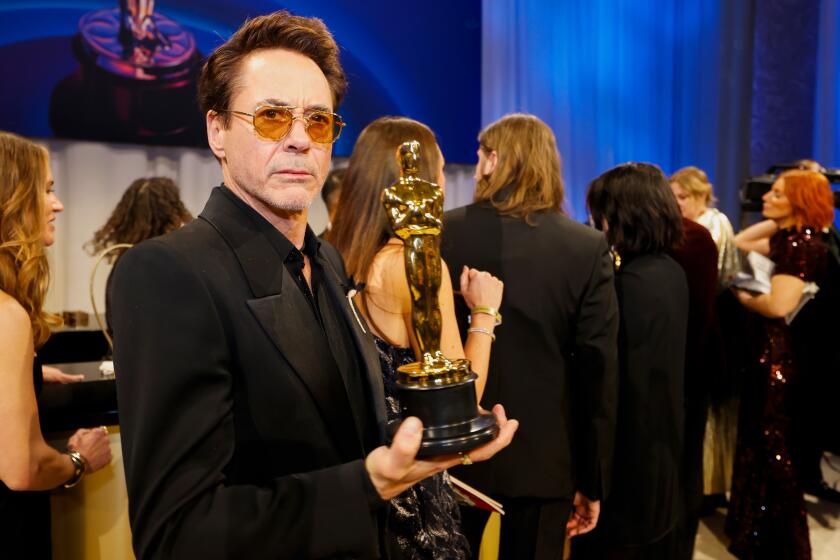The Oscar best picture race could be over this weekend. Here’s why
Talk about a contracted awards season: The Oscar nominations have just arrived and the best picture race may be all but over.
Congratulations to Sam Mendes and the “1917” team. Don’t forget to thank the Hollywood Foreign Press Assn. again when you accept the Oscar.
Maybe I’m getting a little ahead of myself. Maybe in my haste to wash away the sins from an awards season that roundly ignored movies made by women about women in favor of, oh, two more popes than should have been nominated, I’m anxious to roll up the red carpet, watch “Parasite” win its one measly Oscar and finally get around to binge-watching “Dickinson.”
But if Monday’s nominations didn’t settle the Oscar best picture race, Saturday’s Producers Guild Awards could squash the suspense entirely. And after winning the Golden Globe for best picture drama last weekend and over-performing at the box office this weekend ($36.5 million, thanks in part to that Globes bounce), “1917” probably will be celebrating again when the PGA reveals its final award winner.
Mendes’ war movie has accrued unstoppable momentum in a brief window of time.
The biggest Oscar nomination this morning wasn’t Todd Phillips’ nod for directing “Joker” or Kathy Bates slipping in ahead of Jennifer Lopez in the supporting actress category. (Did you not cry along with Bates in “Richard Jewell” when the FBI returned her Tupperware and it was ruined?)
No, the most significant nomination was “1917” earning a spot in the original screenplay category, making Mendes a triple nominee (he produced, directed and co-wrote, with Krysty Wilson-Cairns, the script) and keeping the film safe from some daunting Oscar history.
A movie can win the best picture Oscar without earning any acting nominations. (The list includes “Slumdog Millionaire,” “The Lord of the Rings: The Return of the King” and another war film, “Braveheart.”) A movie can win without a screenplay nod. (Remember when “Titanic” was king of the world?) But if it’s shut out in both areas, you can forget about writing that acceptance speech. You won’t need it.
So “1917” bagged that screenplay nomination. And it doesn’t really need the acting noms because everyone loves George MacKay and Dean-Charles Chapman playing the two British soldiers on a mission to deliver a crucial warning message to comrades about to fall into a trap set by the Germans. Not enough to nominate them, no, but they arrived late to stacked acting categories that didn’t even have room for Robert De Niro (“The Irishman”), Christian Bale (“Ford v Ferrari”), Taron Egerton (“Rocketman”), Eddie Murphy (“Dolemite Is My Name”) and (hold on, I’m wiping away a tear) Adam Sandler’s live-wire turn in “Uncut Gems.”
So the acting omission isn’t a problem for “1917.” The film editors branch shunned the movie as well because its voters apparently respond mostly to manically cut movies (“Beelzebub has a devil put aside for me, for me, for meeeeeeee!”), and “1917” was constructed to appear as if it takes place in a single shot.
Another movie that came up empty with the editors was Quentin Tarantino’s “Once Upon a Time ... in Hollywood,” the one film I think that could wrest the best picture Oscar from “1917,” even though only 10 movies have won that top award without an editing nomination. (“Birdman,” designed, like “1917,” to look like it was shot in one take, was the last.)
Leonardo DiCaprio reacts to being nominated for an Oscar for his role in Quentin Tarantino’s “Once Upon a Time...in Hollywood”
“Once Upon a Time ... in Hollywood” earned 10 nominations, just like “1917” and Martin Scorsese’s “The Irishman,” a mob epic that feels fated to repeat the 0-for-10 Oscar run of the filmmaker’s 2002 period drama “Gangs of New York.”
“Joker” led the field with 11, and though a best picture trophy would go over on social media about as well as an Arthur Fleck appearance on Murray Franklin’s talk show, you can bet that Warner Bros. will go all in on a campaign.
But unlike the other 23 categories in which a popular vote determines the winners, the best picture Oscar is decided on a preferential ballot. Voters will rank the nine nominated movies and then PricewaterhouseCoopers accountants will count the votes and, if one film has more than 50% of the first-place votes, it will win best picture.
If that doesn’t happen (and it probably won’t), the movie with the fewest first-place votes will be eliminated, with its votes given to that ballot’s second-ranked film. The process continues — lowest-ranked movie eliminated, votes redistributed to the next choice down — until one film has more than 50% of the vote.
This means that a divisive movie like “Joker,” a bleak and disquieting film that a lot of academy members tell me they won’t even watch (“I don’t want to invite that character into my life,” one tells me), can’t win. The system is geared to reward not the “best” picture, but the least disliked. “Green Book,” last year’s winner, embodies this winner-most-people-can-live-with ethos. Who hates “Green Book” ... other than the internet?
‘Joker’ tops this year’s Oscar nominations, with ‘1917,’ ‘Irishman,’ ‘Once Upon a Time’ close behind
The 2020 Oscar nominations are out, and the comic book blockbuster ‘Joker’ leads the pack with 11 nominations.
“Joker” and “1917” are both impeccably crafted, reflected in the nominations for production design, cinematography, makeup and hair and sound. But the former wallows in nihilism while the latter offers a moving portrait of bravery, fortitude and friendship. Which movie will be the least disliked?
Maybe neither. Maybe the Oscar will go to “Once Upon a Time ... in Hollywood,” a wistful ode to ... Hollywood and its past. But, making these decisions, voters don’t reflect on questions like: Would it be fair and right if Sam Mendes has two Oscars for directing and Quentin Tarantino has none? Voters go with their guts. Voters also like to back a winner. And with a soaring box office and honors piling up, “1917” has the look of a movie about to own the awards season.
More to Read
Only good movies
Get the Indie Focus newsletter, Mark Olsen's weekly guide to the world of cinema.
You may occasionally receive promotional content from the Los Angeles Times.








